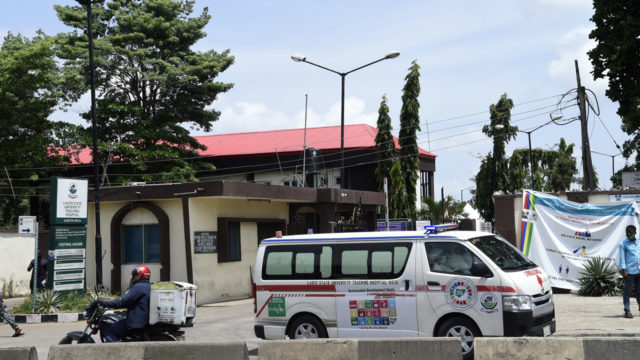The potential closure of more teaching hospitals due to a shortage of healthcare professionals, exacerbated by a significant migration of nurses and doctors abroad, has been highlighted by Dr. Dele Abdullahi, the president of the Nigerian Association of Resident Doctors (NARD).
This concern is underscored by recent reports that the Lagos University Teaching Hospital (LUTH), Idi-Araba, has already closed five wards, affecting 150 beds.

During an oversight visit to LUTH, the House of Representatives Committee on Health, led by Dr. Amos Magaji, expressed deep concern about the adverse impact of this emigration on the nation’s healthcare workforce.
Dr. Magaji reassured that legislative efforts are underway to counteract this trend and address the issue of medical tourism.
Dr. Abdullahi emphasized that the situation at LUTH reflects broader challenges faced by the 52 federal health institutions (FHIs) across the country. The shortage of doctors has resulted in burnout among healthcare professionals, prompting NARD to advocate for a one-for-one replacement policy to alleviate the strain.
Despite interventions by the National Assembly and the Nigeria Governors Forum (NGF), Dr. Abdullahi noted that the Federal Government has not taken substantial steps to hire more doctors or fill the vacancies left by those departing.
He said the Association of Resident Doctors (ARD) in Enugu State University Teaching Hospital (ESUTH) would begin an indefinite strike on December 1 after their demand to increase doctor employment and enhance security within a 14-day timeframe issued on November 18 was not heeded by the state government.
The doctors said it had been 120 days since the Enugu government promised employment of medical officers and resident doctors. Abudullahi warned that if the Federal Government failed to meet their demands next January 2024, industrial harmony could not be guaranteed.
The NARD helmsman, who is a resident doctor at University of Ilorin, submitted: “The issue of shortage of doctors is getting worse, and the government is just beginning to realise. The Minister of Health declared a state of emergency in the sector during the just-concluded National Council of Health (NCH) in Ekiti State.
“As of now, a section of Obafemi Awolowo University Teaching Hospital (OAUTH), the Behavioral Science/Psychiatry, has been shut. According to latest figures from the Nigerian Medical Association (NMA) and Medical and Dental Council of Nigeria (MDCN), there is one doctor to 10,000 patients in Nigeria against the recommended World Health Organisation (WHO) of one doctor to 600 patients.
“I can tell you that it has got worse. Doctors are leaving the country on a daily basis. The situation has resulted in massive burnout of doctors nationwide. NARD is compiling work on ideal manpower that the country needs. Between January and July 2023, 900 doctors left the country and another 900 say they want to leave.
“We request for ‘one replace one’ policy. The idea is to maintain even the suboptimal level we were before now. We are hoping that the Federal Government can look at this policy. It is not just about the shortage of doctors in LUTH, but in Lagos. How many doctors do we have in Lagos State University Teaching Hospital (LASUTH) Ikeja? They are insufficient. There is no health institution in Nigeria that can say they have sufficient manpower.”
A visit to LUTH, yesterday, by The Guardian confirmed the report by the House of Representative panel. However, normal activities were going on at the hospital, and one would not notice that some of the wards have been shut down.
Efforts to speak to the Chief Medical Director (CMD), Prof. Wasiu Lanre Adeyemo, proved abortive, as he did not pick his calls. Also, the medium could not reach the National Association of Nigerian Nurses and Midwives (NANNM) and Nursing and Midwifery Council of Nigeria (NMCN).
But secretary of NANNM, Toba Odumosu, said: “The situation is getting dangerous. More people are leaving. We are experiencing acute shortage, and it is affecting quality of care. We have to bear more burdens.
The situation is that more nurses want to go abroad. The response of the govt is not commensurate. We are calling for a state of emergency. We don’t know what the budget for next year will be. It is time we started looking at the recommended 15 per cent of national yearly budget for health.”
A Consultant Endocrinologist and former chairman, Medical Advisory Committee (CMAC) at LUTH, Prof. Olufemi Fasanmade, said no tertiary hospital or ward could cope with severe shortage of nurses, noting that they are closer to patients.






